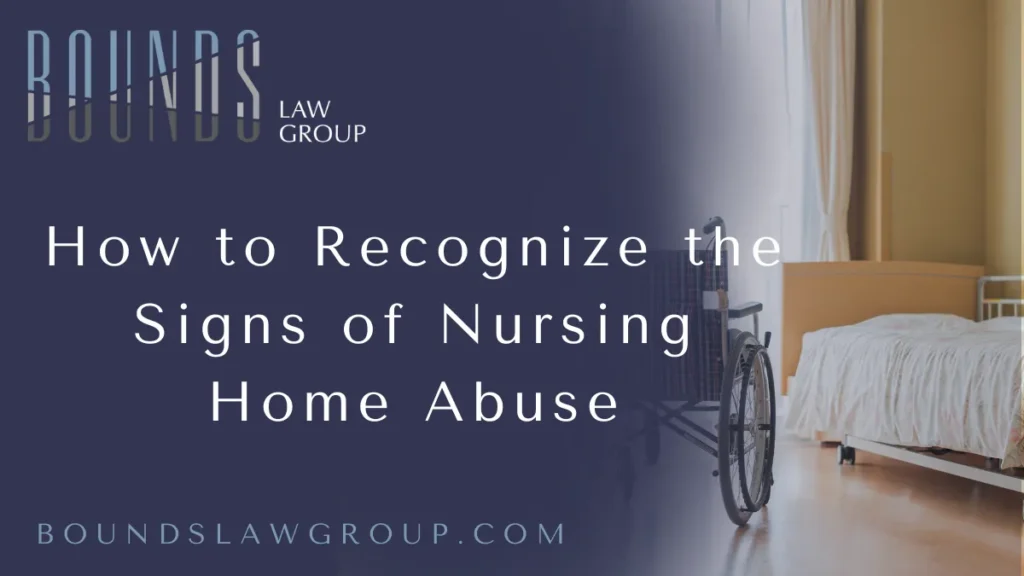
Nursing Home Abuse in Florida | Bounds Law Group
Nursing homes are meant to provide a safe and caring environment for elderly individuals who can no longer live independently. Unfortunately, signs of nursing home abuse are often overlooked or dismissed, leaving vulnerable residents suffering in silence. It is crucial to recognize these warning signs to protect your loved ones and take legal action if necessary. At Bounds Law Group, we are committed to holding negligent facilities accountable and ensuring justice for victims of abuse.
Complete our free case evaluation form or call us now at 877-644-5122 to schedule a consultation.
Physical Signs of Nursing Home Abuse
One of the most obvious indicators of abuse in nursing homes is physical harm. If you notice unexplained injuries or medical conditions, you should take immediate action. Some key signs of nursing home abuse include:
- Bruises, Cuts, or Burns – Unexplained marks on a resident’s body could indicate rough handling, physical restraint, or even outright assault.
- Fractures or Broken Bones – These could be the result of improper lifting techniques, falls due to neglect, or intentional harm.
- Bedsores (Pressure Ulcers) – A clear sign of neglect, bedsores develop when an individual is not regularly repositioned.
- Unexplained Weight Loss or Malnutrition – Poor nutrition can indicate neglect or deliberate withholding of food.
- Poor Hygiene – Dirty clothing, unkempt hair, and an overall lack of cleanliness may suggest that a resident is not receiving adequate care.
If you notice any of these issues, document them and report them immediately.

Emotional and Psychological Signs of Nursing Home Abuse
Not all abuse is physical. Emotional and psychological abuse can be just as damaging, leaving residents feeling isolated, anxious, or fearful. Some signs of nursing home abuse related to emotional harm include:
- Sudden Mood Changes – If a normally cheerful resident becomes withdrawn or depressed, it could be a sign of mistreatment.
- Fear of Caregivers – A resident appearing nervous or scared around certain staff members may indicate they are being abused or threatened.
- Loss of Interest in Activities – If a resident stops participating in hobbies they once loved, it could signal emotional distress.
- Unusual Behavior – Rocking, mumbling, or self-harm could be responses to emotional or psychological abuse.
If your loved one is exhibiting these behaviors, talk to them privately and seek help immediately.
Signs of Nursing Home Neglect
Neglect is a form of abuse that occurs when caregivers fail to provide basic needs such as food, medication, hygiene, or medical attention. Common signs of nursing home abuse due to neglect include:
- Untreated Medical Conditions – Ignoring health problems can lead to severe complications.
- Dehydration – A dry mouth, sunken eyes, and dizziness may indicate dehydration caused by neglect.
- Unsafe Living Conditions – Dirty rooms, soiled bedding, and unclean bathrooms point to inadequate care.
- Missed Medications – If prescriptions are not being administered correctly, residents could suffer from worsened health conditions.
Neglect can lead to serious, life-threatening consequences if not addressed.
Financial Exploitation as a Sign of Nursing Home Abuse
Financial exploitation is a growing problem in nursing homes. Unscrupulous caregivers may take advantage of residents by stealing money, forging checks, or coercing them into making financial decisions. Signs of nursing home abuse related to financial exploitation include:
- Unexplained Bank Withdrawals – Large or frequent withdrawals that the resident cannot explain.
- Missing Personal Belongings – Jewelry, cash, or valuable items disappearing without explanation.
- Unauthorized Changes to Legal Documents – If wills, power of attorney, or financial records are altered without consent, abuse may be occurring.
- Bills Left Unpaid – Even though the resident has sufficient funds, unpaid utility bills or medical expenses may indicate financial mismanagement.
If you suspect financial abuse, report it immediately and seek legal assistance.
Sexual Abuse in Nursing Homes
Sexual abuse is one of the most devastating forms of nursing home abuse. Unfortunately, due to physical limitations and cognitive decline, elderly residents are particularly vulnerable. Signs of nursing home abuse related to sexual misconduct include:
- Bruising in Private Areas – Unexplained injuries around the genitals or breasts.
- Torn or Bloody Underwear – A sign of possible sexual assault.
- Fear or Anxiety Around Certain Caregivers – Unusual discomfort around specific staff members.
- Sexually Transmitted Infections (STIs) – STIs in elderly residents should always be investigated.
If you suspect sexual abuse, report it to authorities immediately and consult legal professionals.

The Role of Understaffing in Nursing Home Abuse
Understaffing is a major contributor to signs of nursing home abuse. Many facilities operate with inadequate staffing levels, leading to overwhelmed caregivers and neglected residents. Some critical issues caused by understaffing include:
- Inadequate Supervision – Residents who require constant monitoring may be left unattended for long periods, increasing the risk of falls, medical emergencies, and wandering.
- Delayed Medical Attention – Staff shortages often lead to delays in administering medications, responding to medical issues, and seeking emergency care.
- Increased Staff Frustration and Burnout – Overworked caregivers may become impatient, leading to verbal abuse or neglecting residents’ needs.
- Lower Quality of Care – Residents may not receive proper hygiene assistance, nourishment, or emotional support due to insufficient staffing.
If you suspect that a nursing home is understaffed and placing residents at risk, it is essential to report the issue and consult an attorney.
How to Take Action Against Nursing Home Abuse
If you notice signs of nursing home abuse, do not ignore them. Here’s what you should do:
- Document Everything – Take photos of injuries, record changes in behavior, and keep detailed notes of conversations with staff.
- Report the Abuse – Notify the nursing home administration and file a report with the appropriate state agency.
- Seek Medical Attention – Ensure the victim receives proper medical care immediately.
- Contact an Attorney – At Bounds Law Group, we specialize in nursing home abuse cases and are ready to fight for justice.
- File a Legal Claim – A lawsuit may be necessary to hold the responsible parties accountable and secure compensation for the victim.
If you suspect a loved one is suffering, do not wait. Complete our free case evaluation form or call us now at 877-644-5122 for immediate assistance.
Sources
- National Center on Elder Abuse (NCEA) – Provides extensive research on elder abuse, including statistics and prevention strategies. Visit NCEA
- Centers for Disease Control and Prevention (CDC) – Offers data and guidelines on preventing elder abuse. Visit CDC
- National Institute on Aging (NIA) – A resource for recognizing elder mistreatment and taking action. Visit NIA

